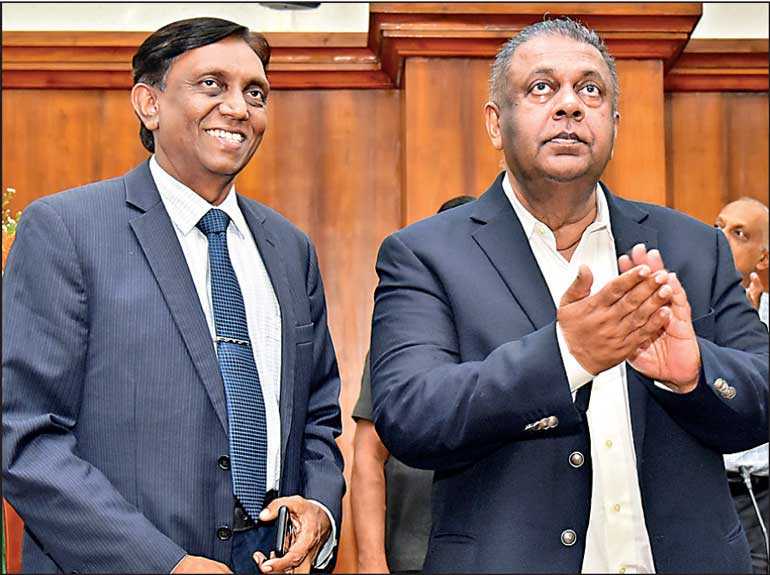Thursday Feb 19, 2026
Thursday Feb 19, 2026
Thursday, 30 May 2019 00:00 - - {{hitsCtrl.values.hits}}

By Uditha Jayasinghe
The Finance Ministry yesterday launched the Electronic Government Procurement (e-GP) system, which aims to improve transparency and competitiveness as well as save public funds when goods and services are purchased by the Government.
Electronic procurement systems have been adopted by most countries around the world, with some being in place for more than 30 years. In South Asia, Sri Lanka has lagged behind in adopting e-procurement with India, Pakistan, Bangladesh and even Afghanistan establishing e-procurement systems.
E-GP makes public procurement more strategic and serves as an effective innovation to institute procurement reforms with greater performance in terms of efficiency, transparency, competition, fairness and value for money. It also provides a wealth of information to decision makers, the private sector and citizens alike, on the performance of public procurement, noted Finance Minister Mangala Samaraweera speaking the launch ceremony.
“We, as a country, annually spend around a quarter of our Government expenditure on public procurement, which amounts to nearly 15% of GDP. Considering the magnitude of that total annual expenditure, it needs closer attention and scrutiny from all the stakeholders in the public management systems.
Corruption, misappropriation and mismanagement of public assets must be tackled with a policy of zero tolerance, which, from my point of view, remains difficult in our part of the world because of systemic weaknesses,” Samaraweera said.
Hundreds of State ministries, departments, and other institutions still use manual procurement processes, which are frequently highlighted for having multiple credibility and transparency issues. The e-GP platform has been established by the Finance Ministry and will be completed by the end of the year.
“In Sri Lanka, the decisions of implementing many important projects are lagging behind because of the manual system that links to the decades-old complicated governance mechanisms. Now in the first quarter of the 21st century, Sri Lanka, as a modern nation, must look forward to utilising new technologies to make our decisions faster, transparent and more accountable. I am convinced that this new e-GP system will save nearly Rs. 30 billion to the Treasury, while improving public financial management to a greater extent,” Samaraweera added.
However, the e-GP system that was launched on Wednesday has not been fully completed and it is not mandatory for Government institutions to use it. In addition the system was launched before the National Procurement Commission’s guidelines, which have been ready since March 2018, have been approved by Parliament. The e-GP system is based on 2006 guidelines which the NPC was attempting to upgrade.
“The system has not been fully completed. It is being formulated in-house with the help of the Colombo University School of Computing. This is a gradual process. We have developed several modules including the user registration module, the procurement planning module, and the standards specification module. The next module is submission of bids online, which we are developing now. We hope to complete the entire platform by the end of this year,” Finance Ministry Public Finance Department Director General P. Algama told Daily FT.
He acknowledged that e-GP was a landmark step but that more training and support would be needed for public employees to start planning procurement and learn to use the platform. Algama also outlined plans to inform key Government agencies and conduct a series of training programmes for officials.
Algama advocated for new operation guidelines for the new platform to be released as well as the appointment of dedicated officials to coordinate with the e-Procurement Department of the Finance Ministry. The cost of the e-GP platform is estimated to be about Rs. 100 million.
The Sri Lankan Government is the largest buyer of goods, services and works in the domestic market. It expended approximately Rs. 597 billion, or 5.3% of GDP, through public procurement in 2015, according to an e-GP study conducted by local think tank Verite Research.
The largest procurement value was disbursed through the Ministry of Highways, Higher Education and Investment Promotion at Rs. 167 billion, followed by the Ministry of Defence and the Ministry of Health and Indigenous Medicine, at Rs. 87 billion and Rs. 66 billion respectively. Around 57% of procurement in Sri Lanka was financed through domestic Government resources in 2015.
Public contracts form the basis of several strategic Government activities, ranging from large-scale infrastructure development to provision of consumables, such as agricultural fertilisers and pharmaceuticals. Procurement also functions as an instrument of economic policy, with the Government providing price preferences to local bidders in order to promote domestic industry and suppliers.